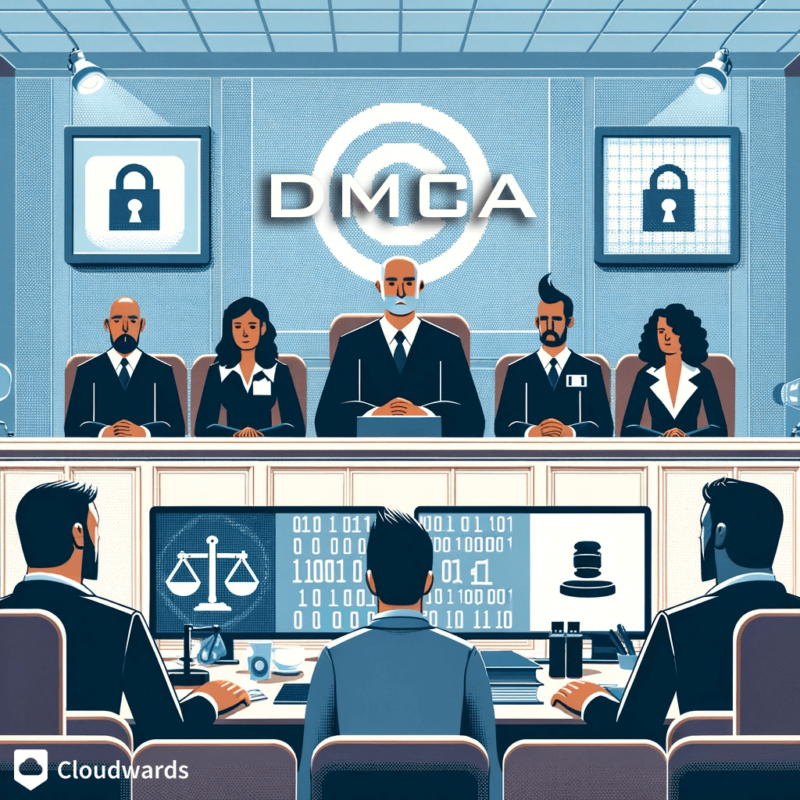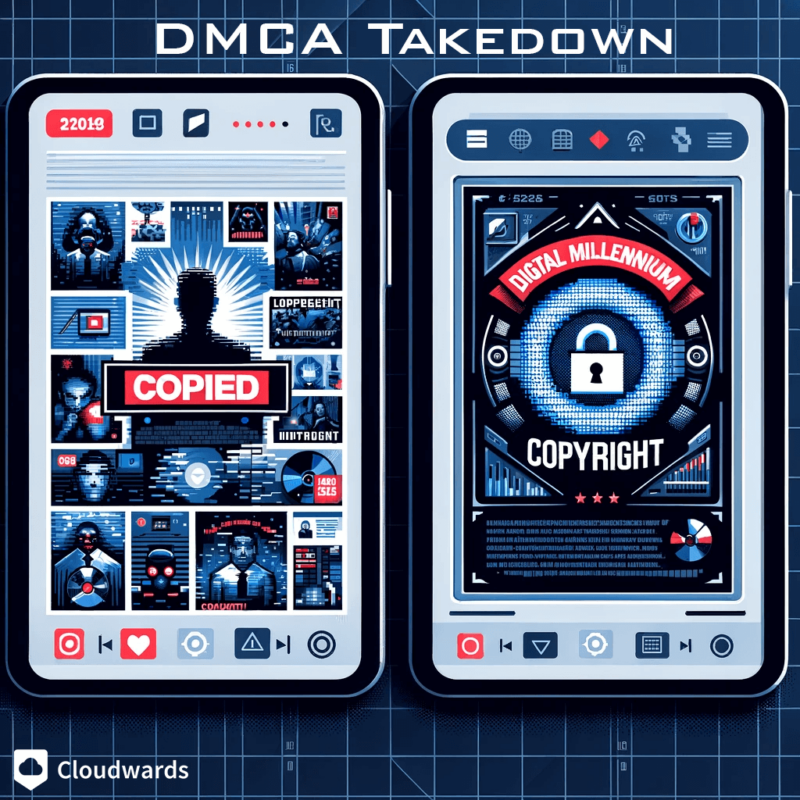What Is DMCA? A 2025 Guide to Copyright Law
The DMCA is one of the most impactful copyright laws of the digital age, but how it works can be a mystery for many. What is the DMCA and how does it affect you? Read on for the answer.
Key Takeaways: What Is the DMCA?
- DMCA stands for Digital Millennium Copyright Act and is a 1998 copyright law that protects site owners from legal liability if one of their users uploads content that infringes on copyrighted material.
- It allows a copyright holder to file a DMCA takedown notice against a service or platform to force it to remove content that infringes on its copyright.
- The DMCA affects site owners, web hosts and internet service providers that can host user-generated content, as well as their users.
- You can fight a DMCA takedown request by filing a counter notice to have legitimate content reinstated on the platform that removed it.
Have you ever tried to find a funny reaction video on YouTube only to discover that it’s been taken down due to a “DMCA request”? The DMCA is a U.S. law that protects copyrighted material from being wrongfully distributed by users on online platforms. However, the way it works can be difficult to understand. In this article, we’ll do our best to answer the question, “What is the DMCA?”
We’ll start by explaining the origins and definition of the DMCA, what material it covers and how it affects online service providers and their users. Then we’ll dive into DMCA takedown notices, and finally, we’ll look into cases where the DMCA does not apply.
-
12/25/2023 Facts checked
We rewrote the article with new examples and simplified explanations of the legal concepts covered by the DMCA.
What Is the DMCA (Digital Millennium Copyright Act)
The Digital Millennium Copyright Act (DMCA), is a federal copyright law instituted in 1998 to protect copyright owners from the misuse and illegal distribution of their intellectual property on the then-nascent internet. It requires site owners to remove copyrighted material posted by users, while also affecting internet service providers who provide internet access to infringers.
The DMCA also defines the process for taking down infringing material, called a DMCA takedown, as well as the process for responding to a DMCA notice.

What Is Infringing Material Under the DMCA?
The DMCA covers any online content — such as music, video, images and written content — that may be copyrighted. It can also include other content, like patents and designs, as long as it’s being copied or disseminated online.
In simple terms, the DMCA is all about access control. If you’re allowing access to copyrighted material to which you do not have distribution rights or accessing copyrighted material unlawfully, you’re breaking the DMCA. In this sense, someone uploading a movie to YouTube is liable under the DMCA, but so is someone torrenting a video game. The DMCA defines two categories of copyright protection circumvention:
- Circumventing copyright protection to gain illegal access to content
- Circumventing copyright protection to copy copyrighted content
The first case is fully illegal under the DMCA, but the second is not. This is intended to allow for fair use, such as transformation of content (think Andy Warhol copying the design for Campbell’s Tomato Soup, or video essayists on YouTube adding commentary and analysis to movie scenes).
DMCA Safe Harbor
Although DMCA regulations mostly concern punishing infringers, they also set out to protect online platforms from the actions of their users. The DMCA defines four cases where a platform or service provider cannot be held liable, called “safe harbors.” These are the four cases in which a service provider is protected under the DMCA:
- Transitory communications: Providing internet access and other network services (affects ISPs)
- System caching: Temporarily storing infringing material on servers or networks (affects ISPs, cloud storage services and server providers)
- Storage of information on systems or networks at the direction of users: Storing user-provided content (affects all online content platforms, social media, cloud services and server providers)
- Information location tools: Provides content search services (affects search engines)
These safe harbor rules don’t fully exempt a service from criminal penalties, though. A service must comply with all DMCA requests and remove infringing content from its servers or network, or otherwise block access to the content. In the case of ISPs, they must forward the DMCA notice to infringing users (such as people who pirate content), and if they are repeat offenders, the ISP must block their access to the internet.
What Is a DMCA Takedown Notice?
If a copyright owner discovers their protected material on an online platform, cloud service or network, they can issue a DMCA takedown notice to the platform owner or internet service provider that hosts the offending content.
The platform owner or service provider is then obliged to act on the notice: They must either immediately remove the content or disable the infringing user’s access to the internet (in the case of ISPs). As long as they comply, service providers can’t be held liable for their users’ DMCA violations, which means that they nearly always comply as soon as possible.
How to Respond to a DMCA Notice
If you receive a DMCA notice from a platform, it means that the platform has received a takedown request for content that you’ve uploaded. Whether that’s a YouTube video containing part of a copyrighted song, a copyrighted movie uploaded to cloud storage or a pirated file you’ve shared, the platform has likely already removed the content from its servers or blocked access to it.

and exploitative copyright holders by filing a counter notice.
DMCA notices can be a pain to deal with, especially if they’re illegitimate. If you believe your content was illegitimately taken down, you can file a counter notice with the service provider. If the original DMCA claim is found to be illegitimate, the provider will have up to 14 days to respond and restore the content, unless the copyright holder has taken legal action against you and the service provider.
Unfortunately, the provider might decide to follow the path of least resistance and side with the claimant. In this case, if you truly are in the right about your use of the copyrighted material, your only choice is to file a civil lawsuit against the claimant and serve in small claims court. This isn’t likely to be worth the trouble unless you’re a content creator whose livelihood is being threatened by a copyright troll.
Fair Use of Copyrighted Material Under the DMCA & Examples
Thankfully, copyrighted content isn’t as strictly protected as you might think, thanks to a rule called transformative use. If you create original content using copyrighted material or parts of it, you need to transform the material in such a way that it is considered significantly transformed and doesn’t encroach on the market for the original work.
However, the content you’ve created must abide by certain guidelines in order to be considered fair use and exempt from any copyright infringement liability:
- Transforms the copyrighted content significantly and critically: The content must be placed in a new context that adds new meaning or messaging and provokes comment. For example, a parody of an original work is considered legitimate content if it differs in tone and meaning.
- Does not compete for sales with the original work: The two works must target different audiences, such as a movie review that uses small amounts of footage in order to provide commentary.
- Does not copy significant amounts of the copyrighted material: Even if the new work is significantly transformative and does not compete with the original, it might still be considered unlawful use if it copies too much content.
- Provides a different use of the work: Sometimes, entire works might be allowed to be copied if their use is altered — for example, for preservation, education or providing legible versions to disabled readers.
This is far from an exhaustive list, as copyright litigation is one of the most complex topics in law. There is legal precedent to support the cases described in this list, but each case has its own nuances.
Final Thoughts
Litigious copyright holders and copyright trolls have been misusing the DMCA to monetize transformative content online and pass it off as stolen content. If you’re ever met with an unlawful DMCA request or attacked by a copyright troll, you should now be better equipped to deal with the situation.
Digital copyright laws and the DMCA can be complex to navigate, but hopefully, our guide has helped you understand it better. Did you enjoy this article? Have you ever been hit with a DMCA notice? What was the outcome? Let us know in the comments below, and as always, thank you for reading.
FAQ: DMCA Explained
A DMCA violation occurs when you upload or share content online that is copyrighted by someone else.
The DMCA protects the rights of content owners and shields websites and service providers from liability for user-uploaded content on their platforms or networks.
If you make a copy of a movie you’ve purchased legally and then upload it to YouTube, you’re violating the DMCA. Another example is if you upload a short part of the film and provide commentary in the form of a review. In that case, you’ve transformed the original work enough that it counts as your own.
The DMCA is a law that stops you from spotting other people’s content online and protects websites from being legally punished for hosting users’ stolen content.


